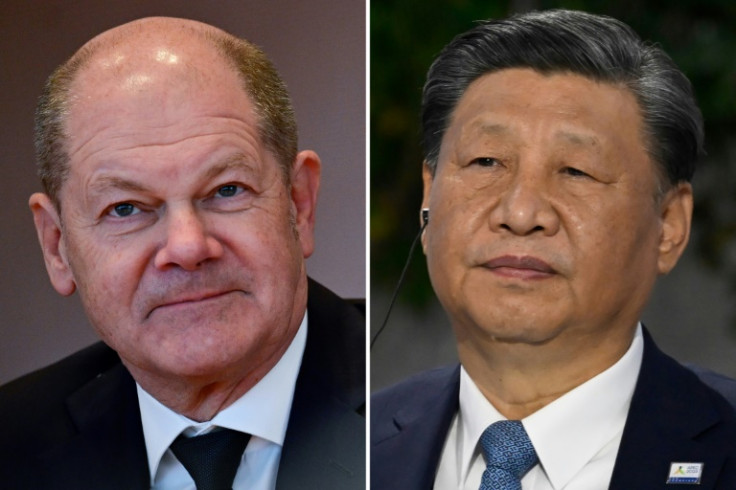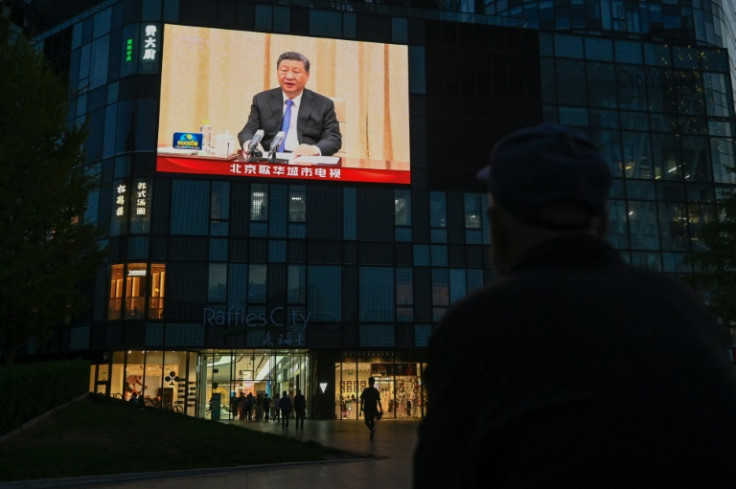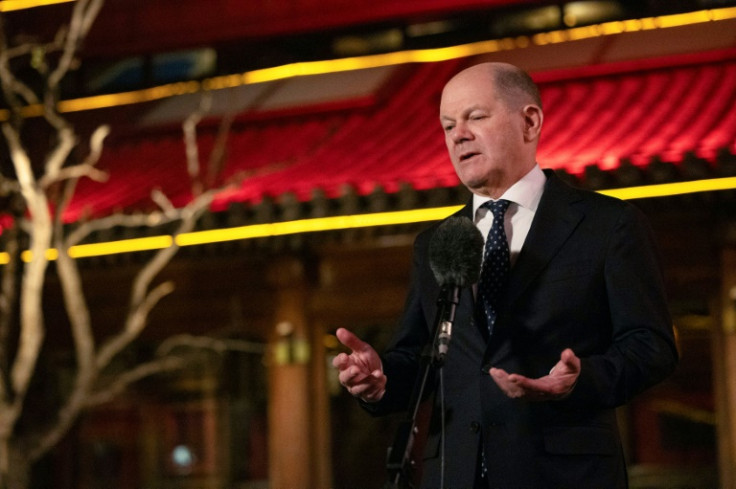Scholz Urges China To Use Russia 'Influence' To End Ukraine War

German Chancellor Olaf Scholz said Tuesday he had urged Xi Jinping to press ally Russia to end its "senseless" war in Ukraine and that the Chinese president had agreed to back a peace conference in Switzerland.
Scholz said after a meeting with Xi at Beijing's Diaoyutai State Guesthouse on Tuesday that "China's word carries weight in Russia".
"I have therefore asked President Xi to influence Russia so that Putin finally calls off his senseless campaign, withdraws his troops and ends this terrible war," he said on social media platform X.
He said Xi had agreed to back the peace conference in Switzerland, which is due to take place in June without Russia in attendance.
China says it is a neutral party in the Ukraine conflict but it has been criticised for refusing to condemn Moscow for its offensive.
China and Russia have ramped up economic cooperation and diplomatic contacts in recent years, their strategic partnership only growing closer since the invasion of Ukraine.
Sholz said in talks with Xi on Tuesday "the Russian war of aggression in Ukraine and Russia's armament have a very significant negative impact on security in Europe", according to a recording provided by the chancellor's office.
"They directly affect our core interests," he told Xi, adding they "damage the entire international order because they violate a principle of the United Nations Charter".
Sholz, whose country is Ukraine's second-biggest military backer, stressed at a news conference later that it was important to "advance the diplomatic efforts that Ukraine is also working very hard on".
"I believe that this is progress that is necessary because, in addition to the military support for Ukraine from Germany and its allies, there is also a need for a dialogue between the two countries," he said.
Chinese state media, in turn, said Xi had highlighted the importance of ties in the face of "increasing risks and challenges".
"China and Germany are the second and third largest economies in the world," state broadcaster CCTV quoted Xi as having said.
He also laid out what state media described as "four principles to prevent the Ukraine crisis from spiralling out of control and to restore peace".
Nations must focus on "the upholding of peace and stability and refrain from seeking selfish gains", Xi said, as well as "cool down the situation and not add fuel to the fire".
"We need to create conditions for the restoration of peace and refrain from further exacerbating tensions," Xi said, while aiming to "reduce the negative impact on the world economy".
The "four principles" echoed a Beijing paper last year that called for a "political settlement" to the conflict, which Western countries said could enable Russia to hold much of the territory it has seized in Ukraine.
CCTV also released footage, set to an uplifting classical tune, of the two leaders going for a walk in the picturesque garden of the statehouse for "in-depth exchanges".
The chancellor arrived in China on Sunday, accompanied by a large delegation of ministers and business executives, for his second visit since taking office.
His whistlestop tour has taken him to the southwestern megacity of Chongqing, economic powerhouse Shanghai and now Beijing, but he faces a tough balancing act as he aims to shore up economic ties with Berlin's biggest trading partner.
Scholz later met Premier Li Qiang for talks focused on economic issues.
The German government has faced pressure to loosen its close economic ties to China, particularly since Moscow's invasion of Ukraine exposed Europe's dependence on Russian energy.
However, after meeting Li, Scholz stressed that "we do not want to decouple from China. We want China to continue to be economically successful", according to a statement released by Berlin.
"For us, in Germany and Europe, it is about reducing one-sided dependencies, diversifying supply chains and reducing economic risks -- a goal that China itself has been pursuing for some time," he said.
His visit comes as a slew of probes into state aid for Chinese solar panels, electric cars and wind turbines are underway in Brussels.
Li described the talks with Scholz as open and constructive, according to the statement from Berlin.
But he stressed that countries should not be accused of having overcapacity and pushed back against claims that China's vast renewable energy industry was being helped by government subsidies.
Subsidies were a common practice around the world, he said, adding that the success of the Chinese renewable sector was due to its capabilities rather than state aid.


© Copyright AFP 2024. All rights reserved.






